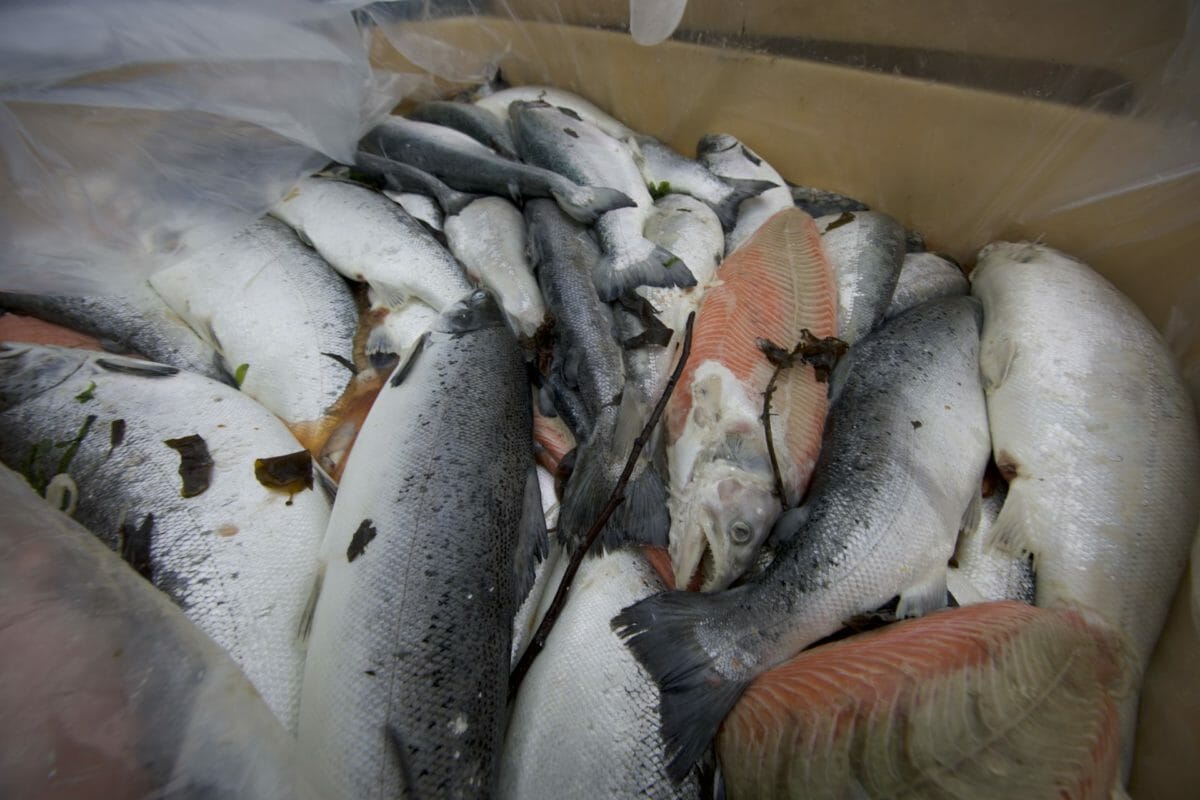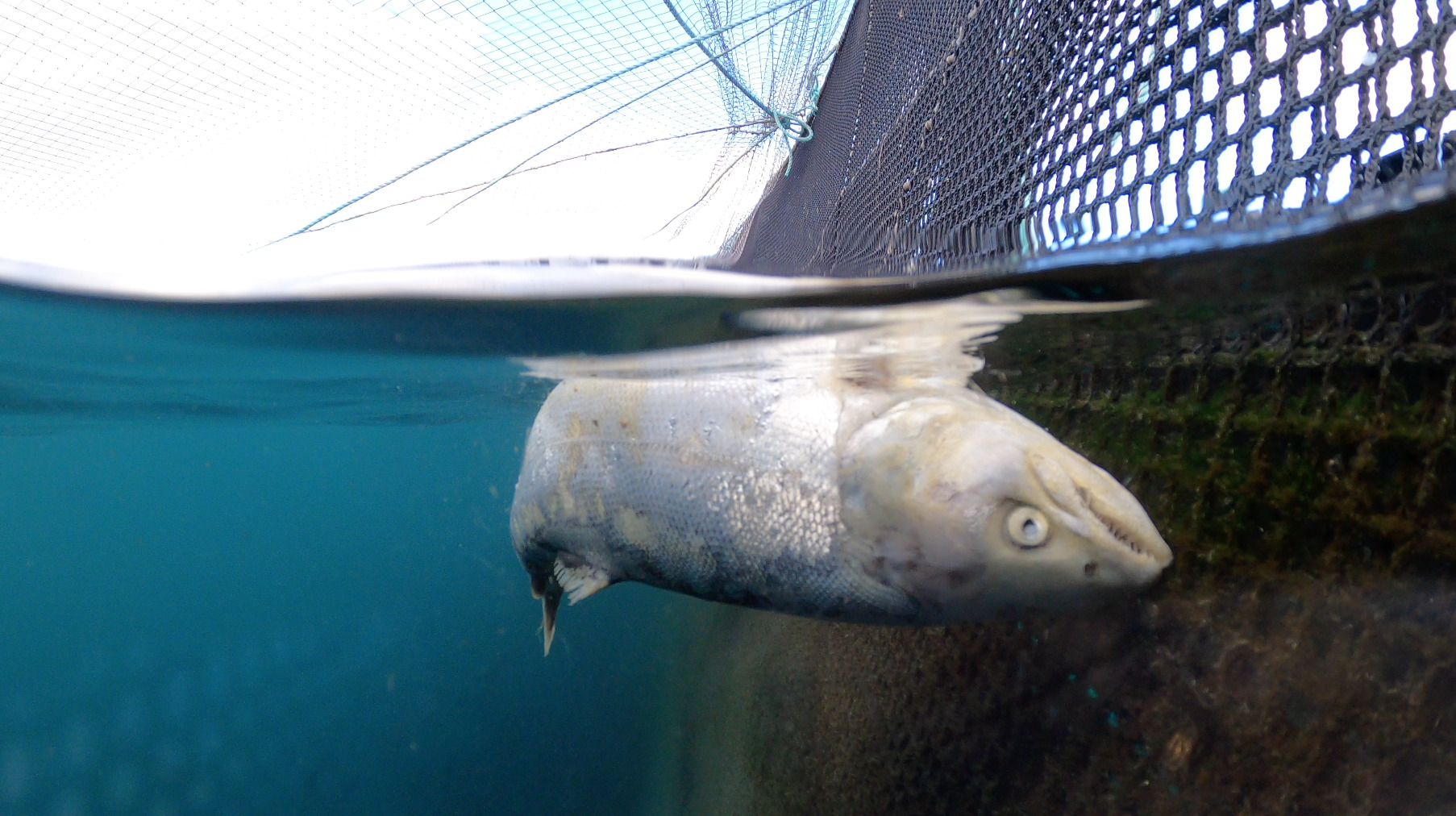Salmon suffering at Scottish fish farms is “endemic” and in breach of animal cruelty law, according to an undercover investigation by animal welfare campaigners.
Compassion in World Farming (CIWF) has released videos and photos claiming to show that the £2 billion salmon farming industry is causing “silent suffering” in “cruel underwater factory farms” across Scotland.
The industry, however, has accused CIWF of being “hugely misleading”, saying that some of its allegations were “wrong” and “grossly inaccurate”. The pictures “do not reflect the extraordinarily high standards Scotland’s fish farmers are setting”, it said.
The Ferret has been reporting on the industry for more than five years, and has previously published video footage showing lice-ridden and damaged fish. Between 14-21 March 2021 we ran a series of stories on public funding, pollution and dead fish disposal.
Compassion in World Farming (CIWF) investigated 22 salmon farms run by five big multinational companies in what it called the “biggest ever exposé” of the Scottish industry. The investigations were carried out between September and November 2020 using drones and – at six farms – underwater divers.
CIWF said it found “severe sea lice infestations and high levels of mortalities” at “several” of the farms, though it hasn’t named any of them. Investigators allegedly found “fish crammed in barren underwater cages” with salmon having “nothing to do but swim aimlessly in cramped conditions for up to two years.”
At one site run by Scottish Sea Farms CIWF investigators reported finding “a considerable proportion” of the fish in an “extremely poor state”. There were “signifiant welfare problems” seen throughout one cage.
According to CIWF, these included “lice damage, seaweed growing in open wounds, gill damage, fin damage, white heads, abrasions and lesions and damage to mouths”. Some fish were “missing eyes and had large chunks of flesh missing”, it said.
CIWF has reported these findings to the UK Government’s Animal and Plant Health Agency, alleging there had been violations of the 2006 Animal Health and Welfare (Scotland) Act.
At an unnamed farm run by Grieg Seafood, the campaigning group said there was “damage caused by lice eating away at the salmon skin and bodies, fin and gill damage, seaweed growing in fish wounds, abrasions and lesions.”
At other farms runs by different companies, CIWF claimed there were “lethargic salmon working hard to breath in dirty water”, “salmon with deformity of the spin” and “dead salmon floating”.
CIWF also said it found “substantially damaged fish”, “overcrowding” and “dumpsters filled with dead fish exposed to wildlife, possibly posing a biosecurity risk.”

Backed by other groups, CIWF is writing to the Scottish Government, urgently calling for a moratorium on the expansion of the industry “with a view to phasing out intensive salmon farming”. It pointed out that up to a quarter of caged salmon can die before they are harvested, and that the industry has damaged the environment.
“Salmon are silently suffering, out of sight, in cruel underwater factory farms across Scotland. Even the experienced investigators were shocked at what they found,” said Sophie Peutrill, Compassion in World Farming’s global campaign manager for fish welfare.
“The footage reveals salmon with deformities and disease, missing eyes and large chunks of flesh and skin being eaten away by sea lice. This is completely unacceptable.”
Peutrill added: “Salmon are sentient beings – they should not be subjected to such awful misery. There is an industry-wide failure to protect these animals, and this must change. We need an immediate halt on the continued expansion of Scottish salmon farming.”
The Scottish animal campaign group, OneKind, agreed that millions of salmon were suffering “out of sight” on Scotland’s fish farms. It has produced a report with CIWF entitled “Underwater Cages, Parasites and Dead Fish”.
The report exposes “salmon suffering on an industry-wide and endemic scale, breaches in animal welfare legislation and shockingly high mortality rates,” said OneKind policy advisor, Kirsty Jenkins.
“These animals deserve better. We are calling on the Scottish Government to immediately halt the continued expansion of Scottish salmon farming. Ultimately, intensive salmon farming must come to an end.”
The Scottish Salmon Producers Organisation (SSPO), which represents the industry, attacked CIWF’s allegations, saying that farmers work tirelessly to avoid fish suffering. “Unfortunately sometimes they do get sick or injured despite the very best efforts of certified veterinarians,” said SSPO chief executive, former Liberal Democrat MSP, Tavish Scott.
“However, not only are these images totally unrepresentative of our sector, which has some of the highest fish health and welfare standards in the world, but there are key parts of this report which are wrong, inaccurate and misleading – claims we would have pointed out to CIWF, had they approached anybody in the Scottish salmon farming sector before publishing.”
Scott described salmon farming as “one of the country’s greatest environmental and economic success stories”. It had “created thousands of well-paid jobs in some of Scotland’s most fragile rural areas and is producing a protein with one of the lowest carbon footprints around,” he argued.
“We are extremely proud of the support given to us by governments, global fish-welfare accreditation bodies and consumers – all of whom appreciate the healthy, nutritious and sustainable food we produce.”
By selectively publicising those very few pictures, CIWF is being hugely misleading.
Ronnie Soutar, Scottish Sea Farms
Scottish Sea Farms also defended the health of its fish. “No-one wants to see any fish potentially suffering but thankfully, those occasions are rare,” said the company’s head of veterinary services, Ronnie Soutar.
“By selectively publicising those very few pictures, CIWF is being hugely misleading. Those pictures do not reflect my experience of the extraordinarily high standards Scotland’s fish farmers are setting.”
He added: “The reality is that vast majority of our fish are extremely healthy. The evidence is clear in the excellent quality of the fish we harvest.”
Grieg Seafood, which farms in Shetland, accepted that “more needs to be done” to improve fish welfare. “All farmers and food producers have a responsibility to reduce our impacts, improve animal welfare and contribute to a more sustainable food system during the next decade,” said the company’s managing director, Grant Cumming.
The challenges mentioned by CIWF were “high on our agenda already”, he told The Ferret. “We understand and accept we must reduce our impact on nature and ensure co-existence with wild salmon and other species.”
“We must improve fish health and welfare,” Cumming added. “We must work hard reduce our impacts and solve our challenges through innovation, new technology and continuous improvement.”
The Scottish Government stressed that salmon farmers had to comply with “tough” animal welfare standards. “The Animal Health and Welfare (Scotland) Act 2006 protects farmed fish from ‘unnecessary suffering’ and the Animal and Plant Health Agency will investigate complaints and take enforcement action where appropriate,” said a spokesperson.
“Almost all salmon farms in Scotland are members of the Royal Society for the Prevention of Cruelty to Animals assurance scheme and are regularly inspected to check compliance with their requirements and those of retail customers. It is a highly regulated industry and subject to a number of environmental controls.”
The Scottish Government highlighted the economic benefits of the industry, and argued that there had been a “downward trend” in sea lice infestations. “New legislation will come into force at the end of March which will require mandatory reporting of sea lice numbers to help manage their impact on health and welfare,” the spokesperson added.
“In addition we have refocused our 10-year Farmed Fish Health Framework to concentrate on areas that make a direct difference to farmed fish health and welfare. This includes developing analysis of the causes of mortality with a view to better understanding and addressing them.”
The UK Animal and Plant Health Agency (APHA) said it was aware that concerns had been raised but couldn’t comment on individual cases. “We take potential breaches of animal welfare legislation very seriously and investigate all allegations,” said a spokesperson.
“APHA works collaboratively with the local authority, Marine Scotland and other enforcement agencies when required. Where welfare regulations are breached, appropriate action is taken.”
The fish farming industry is likely to face further criticism in a television documentary called Seaspiracy due to be broadcast on Netflix from 24 March.
This story was updated at 13.25 on 23 March 2021 to include comments from the Animal and Plant Health Agency, and again at 13.55 to add comments from Grieg Seafood. Photos and video thanks to Compassion in World Farming.















You should approach RSPCA. What they are doing in rubber-stamping the industry is unforgivable. They are just treating it as a way of making money (from the certification scheme) with no regard to fish welfare. Why are RSPCA doing it anyway and not SSPCA?